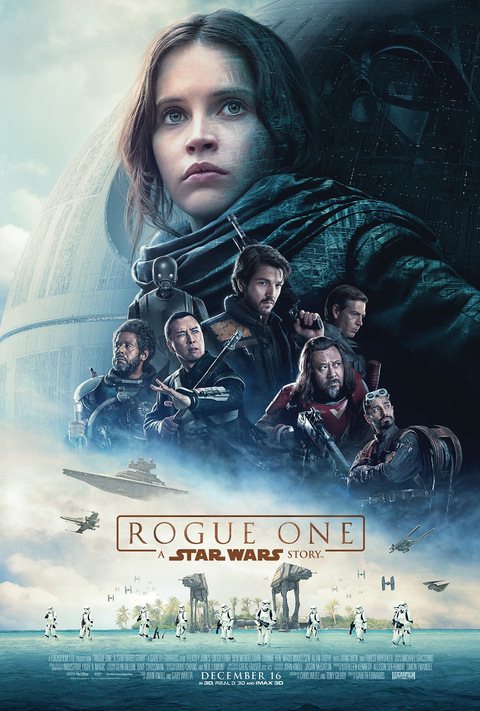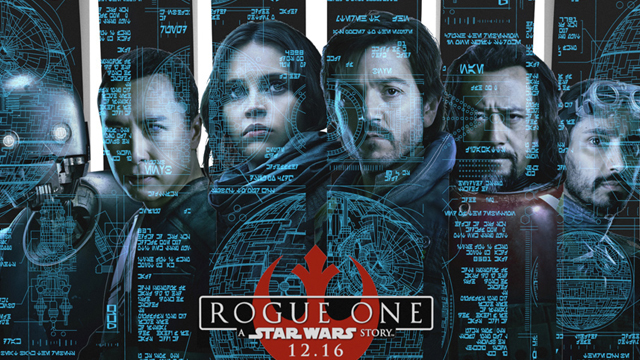Palimpsest: My Take on "Rogue One: A Star Wars Story"
I mentioned to selected friends that I was planning on seeing Rogue One: A Star Wars Story, the 2016 film that has raked in ungodly amounts of cash at the box office. I wasn’t planning on writing a full review, but with an 85% approval rating on “Rotten Tomatoes,” I have a few of my own thoughts to share. No spoilers, I promise.
 Was it worth watching? At over two hours run time, it had better be. I can’t say that I was bored, but I honestly have a few “issues” with the film. On the plus side, those who subscribe to the “great man” (or in this case, “great woman”) theory of history will no doubt take comfort in the recognizable if stereotypical characters in this drama. Those to whom hackneyed, predictable dialog is not an impediment to enjoying over two hours that foreshadow the original (1977) Star Wars film will enjoy this film. The action sequences mimic every World War II film you’ve ever seen or heard, yet they fit in well with the storyline of sacrifice for something larger than oneself. And when has sacrifice been popular? Also, I applaud the inclusion of female and black/brown/Asian heroes.
Was it worth watching? At over two hours run time, it had better be. I can’t say that I was bored, but I honestly have a few “issues” with the film. On the plus side, those who subscribe to the “great man” (or in this case, “great woman”) theory of history will no doubt take comfort in the recognizable if stereotypical characters in this drama. Those to whom hackneyed, predictable dialog is not an impediment to enjoying over two hours that foreshadow the original (1977) Star Wars film will enjoy this film. The action sequences mimic every World War II film you’ve ever seen or heard, yet they fit in well with the storyline of sacrifice for something larger than oneself. And when has sacrifice been popular? Also, I applaud the inclusion of female and black/brown/Asian heroes.
I’m not sure that watching in IMAX 3D really enhanced the experience, but I gave it a go. As for characters, I enjoyed the re-programmed imperial droid who had a personality that wasn’t as grating as that of C-3PO. The female hero – we used to call these heroines before that apparently became sexist and demeaning – becomes even more heroic after the greatest personal tragedy in her life. There were a couple of digitally resurrected characters from the original Star Wars. The only character I really took issue with was the blind monk who tries to feel The Force: why can’t we stop patronizing blind people by endowing them with superior insights and miraculous powers?
I’ve been criticized before (I think a more accurate term would be “lambasted”) for saying that I think the Star Wars genre is fiction for teenagers who can’t handle the more grown-up themes and near-atheism of the Star Trek universe. In my opinion, Star Wars is about video game battles and simple-minded good vs. evil conflicts: it’s action-adventure and thrills and chills, like a roller coaster. By contrast, the Star Trek series (if not the films) is so nuanced about the concepts of good and evil that it often dispenses with any true villains and any clear-cut solutions. But for the most part, Star Trek solutions don’t include violence. Indeed, in the Star Trek universe, the use of violence is seen as a failure of intellect.

I digress. For Rogue One, and the entire Star Wars universe, there is one thing I simply can’t get past: The Force.
I think George Lucas invented The Force to appeal to the “spiritual-but-not-religious” crowd of young people who, and I think with good reason, feel disaffected from mainstream religion and who may be too timid to reject belief in the supernatural altogether. It has been called “a religion for the secular age,” but to me, The Force is a palimpsest: something reused or altered but still bearing visible traces of its earlier form. Basically, The Force is a mash-up of early Christian faith, ESP/telekinesis, Zoroastrianism, Taoism, Buddhism and a vague connectedness of all life – even over vast distances of space and across vast differences among species. In my estimation, The Force is a cheat code in the video-game Star Wars universe, suggesting a belief in the supernatural without endorsing any specific religion and premised on the existence of the supernatural and distinct ideas of good vs. evil.
But in the Star Wars universe, The Force is used variously as duct tape over plot holes, a bright line separating good vs. evil, a firmament separating the elect from the masses. It is naturally hierarchical and therefore undemocratic. Sure, everybody has the potential to tap into The Force – but, as with Christian theology, you have to believe it before you will see it. That is the exact opposite of how science and empiricism work, and these two human inventions are the cornerstones of an evidence-based approach to reality.
Taken on its own terms The Force isn’t complicated, it’s just old spiritual wine slapped with a new label. But in an adventure film aspiring to be about rebellion and sacrifice for a greater cause, I question the relevance of the veneer of mystical mumbo-jumbo. Generally for the franchise, but specifically for Rogue One, if you intend to tell a human story, The Force just seems so unnecessary.

